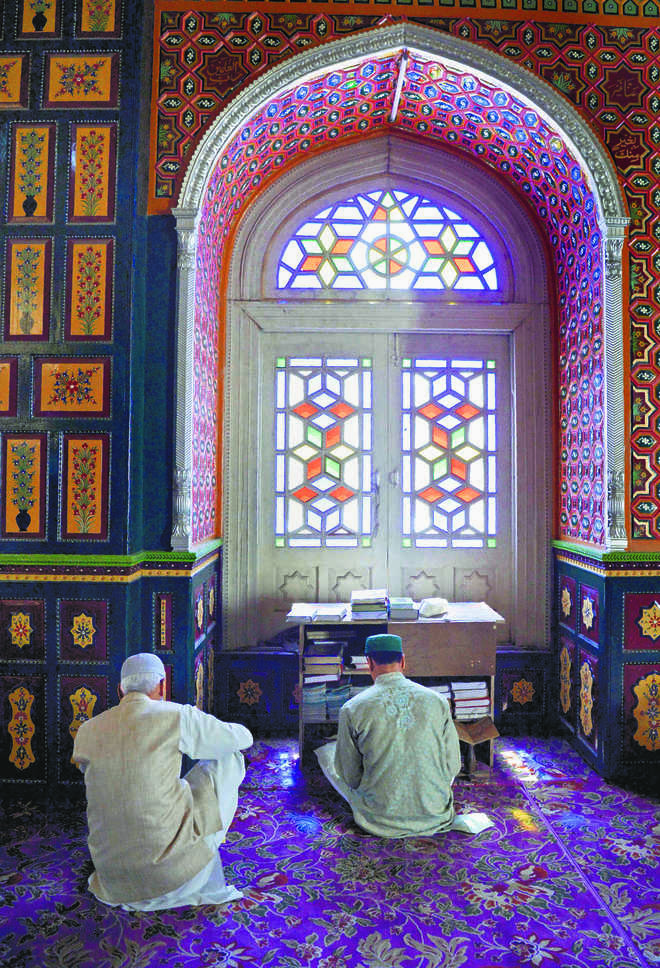- Kashmir’s Ramzan hopes



Azhar Qadri
Ramzan brings us to prayers and piety — a month of forgiving and forgiveness. Each year it brings hope in whatever looks dark, desolate and beyond redemption. It is like a divine opportunity being offered again and again to strive for higher goals in life. The message remains clear: peace is worked at no matter how grim the situation is. There are no winners. And for those in Kashmir whose dear ones stood kneeling alongside them until the last Ramzan, there are tears, and prayers for peace. It is for the first time in 18 years that the Valley is relatively calm. Here are a few families who have suffered, many losing their near ones. Yet they keep their spirits high: tomorrow would be a much better day.
A roadside house
Bashir Ahmad Bhat was hit by a bullet in his shoulder in a gunfight between militants and security forces on May 13 during the dead of the night in Chinar Bagh, Pulwama. Bhat, a butcher and father of a 10-year-old daughter and 16-year-old son, has the bullet lodged in the shoulder for nearly two weeks. He is due for a surgery.
The bigger worry for Bhat, however, is the house which he had constructed three years ago, in which his family of five lived. “I am worried that my family is living in a tin-shed and enduring this pain,” he says. Bhat’s house had four rooms before it was badly damaged in the gunfight. In one of the rooms, pages of algebra work of Bhat’s class 10th son lay scattered on the floor. “We want you to be fine. What are we without you?” says his wife. “We will rebuild …this is the holy month,” she says.
The counter-insurgency operation at Chinar Bagh ended early that morning. It was one of the last firefights before the Ramzan ceasefire was announced. “It has made a lot of difference, things are calm,” says Showkat Ahmad, Bhat’s cousin.
Son as a stone-thrower
Ghulam Ahmad Mir wakes up and finishes sehri — a pre-dawn meal taken before beginning the Ramzan fast — and then he rushes to the nearby mosque. Mir leads several hundred residents of Pulwama’s Ruhmoo village in their prayers. He does it every day, even on the day when his son, Mohammad Asif, had left home and returned dead — shot and killed during a protest in Shopian on May 6.
While his father was in the mosque, Asif had left for Badigam, a village in Shopian where a gunfight had erupted. “Had I been home, I would not have let him go,” says Mir. Asif (18) had set up a library – most books on self-improvement such as You Can Win by Shiv Khera. Mir now spends most of the time inside the mosque where he leads the daily prayers and prays for forgiveness and patience.
A militant’s father
Firdous Lone was working as a computer lab assistant at a government medical college in Srinagar. He disappeared in September 2016 in the aftermath of the killing of militant Burhan Wani. His family started a frenzied search. “He was a very religious boy,” says Lone’s father Abdul Rashid. “For the next four months we searched everywhere, even the sky,” he says.
Five months later, Lone surfaced in a signature-style adopted by militants to announce their new life. His picture was uploaded on social media sites in which Lone was carrying an assault rifle. Lone was killed in a gunfight in Chaigund village of Shopian that marked the beginning of the year. The gunfight that January and the subsequent protests left two militants and four civilians, including one of the militant’s sisters, dead.
In Ganawpora, Lone’s village nestled in the orchards in Shopian district, his father whispers; his words quivering: “My son… I lost him.”
Pellets and PhD
Ahmad, his middle name, was a first-year college student when he was hit by pellets during a demonstration in Ramzan a few years ago. He was not part of a demonstration but had an altercation with a policeman. He was hit with a barrage of pellets that damaged his face and blinded him.
Ahmad spent the next two years visiting hospitals where doctors succeeded in partially restoring his vision in his one eye. Ahmad did not lose hope. Relying on his auditory senses, Ahmad studied and completed his graduation and post-graduation in political science. He was among the few victims of pellet guns who have continued their studies.
The use of pellets against demonstrators has come under criticism from human rights organizations, which have urged the government to “immediately stop the use of pellet-firing shotguns”. Next week, Ahmad is appearing for an interview for Ph.D in a foreign university. “I am hopeful, inshallah, I would qualify,” he said.
Courtesy: Tribune: May 27, 2018


